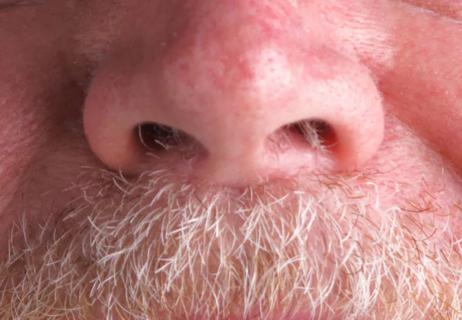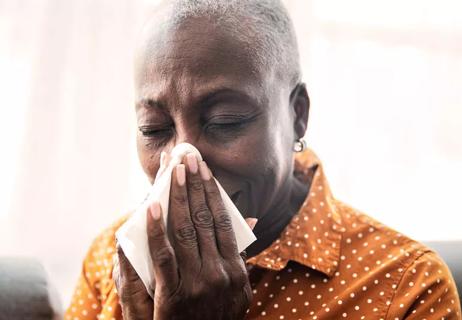Our least appreciated organ that's responsible for so many big things

Our noses are generally the subject of both admiration and criticism. Some love their nose, others would change it if they could.
Advertisement
Cleveland Clinic is a non-profit academic medical center. Advertising on our site helps support our mission. We do not endorse non-Cleveland Clinic products or services. Policy
But it’s easy to forget that your nose, along with your eyes and mouth, don’t just make up your visual identity. And there may be an argument for loving it the way it is.
According to ear, nose and throat specialist Michael Benninger, MD, your nose in particular is one of the most complex and elegant organs in your body. It performs critical life functions and really deserves huge props for its role in keeping you alive and safe — and quite often satisfied.
It’s even responsible for your sex life. (It’s true).
“Your nose is the first organ in your upper respiratory system and one of the main reasons you both survive and thrive,” he says.
Here Dr. Benninger points out several surprising facts about your nose that you might not know.
You’re likely already appreciative of your breath, but it’s kind of a big deal as your nose and mouth are the pathway of air entering and exiting your lungs. In normal everyday breathing your nose is the primary pathway.
Even during exercise where mouth breathing becomes more dominant, some air also still passes through your nose.
“It’s always interesting that although your mouth is a bigger tube, people feel more uncomfortable if their noses are plugged or congested,” Dr. Benninger notes. “That’s how important your nose really is.”
Advertisement
Nasal breathing is also most critical in newborns who breathe through their noses almost all the time. Dr. Benninger adds, “It’s a unique feature related to the configuration of their throats that allows them to breathe and suckle at the same time, without choking.”
“This doesn’t happen in older children or adults,” he adds. “We have to stop breathing to swallow. Something to appreciate next time you aren’t getting air in your nose for a few seconds.”
Your nose processes the air you breathe, preparing it for your lungs and throat which do not tolerate dry air well.
As inhaled air passes through your nose, it’s moisturized and humidified thanks to a multiple-layer air pathway with three sets of turbinates (called upper, middle and lower conchae). These are long bony structures covered with a layer of tissue that expand and contract.
This path is where drainage and moisture is regulated. If you have a dry throat, it means the air in this passageway may not have been humidified.
This is also the place where the tone of your voice is shaped as air passes through and the passage expands or contracts.
The air we breathe has all kinds of stuff in it – from oxygen and nitrogen to dust, allergens, smoke, bacteria, viruses, small bugs and countless other things. Your nose helps clean it.
On the surface of the nasal tissues in your turbinates, there are cells with tiny hair-like appendages called cilia that trap the bad debris in the air so it doesn’t get into your lungs. Instead, the debris sits in the mucous and is eventually pushed into your throat and swallowed.
“This is extremely beneficial since our stomachs tolerate handling bad debris much better than our lungs do,” Dr. Benninger says.
In the same way your throat and lungs don’t like dirty air, they also don’t like air that’s too cold or too hot.
According to Dr. Benninger, the passing of the air through your nose allows the air to become more like your body temperature, which is better tolerated by your tissues.
Warming cool air in your nose is more common than cooling warm air. That’s because humans spend much more of their time in environments below body temperature — 98.6° — than above it.
“That runny nose you get in cold weather is the best example of this warming and humidifying effect,” he says. “It comes from the condensation of the moisture in your nose when the cold air goes in.”
High in your nose are a large number of nerve cells that detect odors. In order to smell, the air we breathe must be pulled all the way up to come in contact with these nerves.
Advertisement
Smell plays a key role in taste. We have four primary tastes: bitter, sour, sweet and salty. All of the refinements in taste are related to smell. That’s why people feel that food is tasteless when their ability to smell is decreased.
“Smell and taste are necessary for safety. We need our smell to detect smoke, spoiled food, and some toxic poisons or gases,” Dr. Benninger says.
When we have a cold or allergies, it’s hard for the air to get to these receptors, so people notice a decreased ability to smell.
Those who have completely lost their sense of smell need to have alarms for these gases and must be pay closer attention to what they eat.
Smell partners with your olfactory bulb located in the front part of your brain, just above your nasal cavity. It’s the part of your brain’s limbic system and is associated with memory. We identify other people by the memory of what their personal smell is.
Dr. Benninger points out how this works. “You might remember someone specifically when you smell a certain perfume, soap or similar body odor. If it triggers your memory and you get nostalgic and emotional, that’s also because the limbic system is associated with the control of the emotional part of your brain.”
Advertisement
“It’s amazing how many of our body functions are directed toward sexual activity and reproduction,” Dr. Benninger says.
Not only does your olfactory system trigger memory, but your nose plays a critical role when paired with your olfactory system in your perception of sex.
That characteristic smell of a person’s perfume, cologne or the scent of their shampoo or soap is important to sexual arousal. The smell of human perspiration also has a direct effect on sexual receptors in the brain. And loss of smell correlates with decreased sexual drive.
Another interesting and widely debated area is the impact of pheromones. These are very important to reproduction in animals, as well as on human sexuality and stimulation.
A small accessory organ in the nose – the vomeronasal organ (VNO) – is related to the olfactory system. Some refer to it as the sixth sense. The VNO is located at the base of your nasal septum (in the roof of your mouth) and almost all animals, including amphibians, have it.
“In humans, the VNO is largely vestigial or non-functional, acting as an old remnant like your appendix. But some researchers believe that it still plays a role in pheromone and other chemical communication,” Dr. Benninger says.
Advertisement
What we hear when people speak and sing is in large part related to the resonating structures of the throat and nose.
Your voice is produced in the larynx but that sound is really a buzzing sound. The richness of the sound is determined by how the sound is processed above the larynx, which occurs in your nose and throat.
According to Dr. Benninger, this is the same principle that separates a grand piano from a child’s toy piano. The nasal voice we hear in someone with a cold and allergies is due to a loss of this nasal resonation since air can’t pass through the nose.
Sinuses also play a part of the resonance in your voice.
It’s hard to talk about the nose without mentioning the sinuses, which have a number of important and positive roles, according to Dr. Benninger.
Your sinuses are air-filled structures in your head that make your head lighter and probably played an important role in allowing us to become upright. They also serve as air cushion shock absorbers that help protect your brain and eyes.
The partnership between your nose and sinuses help control the amount of nitric oxide in your body and in your lungs. They also play a huge role in your immune functionality.
“When it comes to your nose, there’s a lot of amazing information to think about,” Dr. Benninger says, “But next time you look in a mirror, you may want to consider a new respect for the incredible – and only one – you’ve got.”
Learn more about our editorial process.
Advertisement

Picking your nose and eating the results isn’t polite behavior, but odds are, it won’t make you sick

How to handle the thicket of long hairs sprouting from your nose

Reduce unnecessary antibiotics to help your immune system

If your nose is constantly running, it could be allergies, chronic sinusitis, nasal polyps or other concerns

Neti pots can be useful for sinus pressure relief and removing excess mucus

Sudden hearing loss can have many causes — but it’s important to seek treatment fast

This dangerous practice can cause burns or a ruptured eardrum, and can make earwax blockages worse

Upper respiratory infections, seasonal allergies, excessive use or talking too loudly can make it difficult to speak

Start having sex about 72 hours before ovulation, then at least every other day during your fertile window

Attachment theory suggests that your earliest relationships shape connections throughout your life

It isn’t a recognized mental health disorder, but research shows that problematic social media use can negatively affect your mental health, self-esteem and sleep